#publishers
Explore tagged Tumblr posts
Text


#black tumblr#black literature#black history#black excellence#black community#civil rights#lucille bishop smith#texas#black history is american history#civil rights movement#blackexcellence365#black girl magic#black history month#prairie view a&m college#publishers#cookbook author#cookbook#black americans
173 notes
·
View notes
Text



One of four pages published in the collective "autre chose" by swiss éditions Atrabile last year for their 25 years of existence. 168 pages , quadri A4, softcover.
With 44 other artists:
Adèle Maury, Amanda Baeza, Amandine Meyer, Awen Rivière, Barbara Meuli, Camille Potte, Chien-Fan Liu, Emilie Gleason, Fred Fivaz, Geoffroy Monde, Giacomo Nanni, Guillaume Fuchs, Helge Reumann, Jean-Michel Bertoyas, Juliette Mancini, Jung-Hyoun Lee, Laurie Agusti, Léa Murawiec, Lika Nüssli, Lisa Blumen, Louise Collet, Lucas Burtin, Marijpol, Martina Sarritzu, Mathilde Van Gheluwe, Melchior Best, Mia Oberländer, Michael DeForge, Noémie Chust, Rachel Deville, Simon Beuret, Valentine Gallardo, Violaine Leroy, Yannis La Macchia, Alex Baladi, Frederik Peeters, Ibn Al Rabin, Isabelle Pralong, Joseph Callioni, Nicolas Presl, Peggy Adam, Pierre Wazem, Thomas Gosselin, Tom Tirabosco
#samplerman#samplerman 2023#atrabile#swiss#page#comics#comics collage#collage#book#collagecomics#switzerland#edition#publishers#birthday
108 notes
·
View notes
Text
Dear Reader,
I’ve spent the last year writing letters to things that can’t write back— to love, to misery, to my dad, to the body I’ve lived in, and the soul I’ve hid from.
These letters bled into poems. And those poems became Dear.
It’s a collection about what it means to exist in the half-light— the quiet, aching spaces between grief and joy, between holding on and letting go.
The letters are restless now. They’ve grown tired of silence. And they’re waiting for you.
Until the ink runs dry, -M.M

#letters#books#poems and poetry#poetry#publishers#writeblr#spilled poetry#DEAR#MM#spilled ink#original poem#poets on tumblr#poem#poetblr#personification#personal#poetry book#boo#books and reading#booklr#reading#book club#poetry corner#poetry on tumblr#poetry community#poetry blog#poetry quotes#words words words#prose#poetic
121 notes
·
View notes
Text

critical support to the internet archive
(https://www.theverge.com/2024/10/9/24266419/internet-archive-ddos-attack-pop-up-message)
#internet archive#internet#archive#class war#brewster kahle#publishers#anti capitalism#antifascist#ausgov#politas#auspol#tasgov#taspol#australia#fuck neoliberals#neoliberal capitalism#anthony albanese#albanese government
60 notes
·
View notes
Text
Middlemen without enshittification
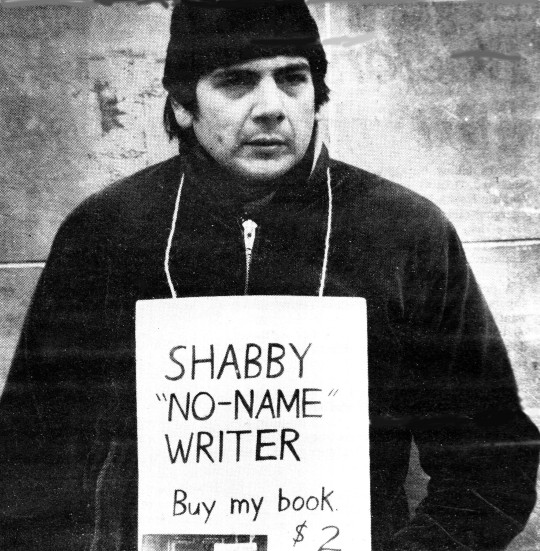
I'm on tour with my new novel The Bezzle! Catch me next in SALT LAKE CITY (Feb 21, Weller Book Works) and SAN DIEGO (Feb 22, Mysterious Galaxy). After that, it's LA, Seattle, Portland, Phoenix and more!

Enshittification describes how platforms go bad, which is also how the internet goes bad, because the internet is made of platforms, which is weird, because platforms are intermediaries and we were promised that the internet would disintermediate the world:
https://pluralistic.net/2024/01/30/go-nuts-meine-kerle/#ich-bin-ein-bratapfel
The internet did disintermediate a hell of a lot of intermediaries – that is, "middlemen" – but then it created a bunch more of these middlemen, who coalesced into a handful of gatekeepers, or as the EU calls them "VLOPs" (Very Large Online Platforms, the most EU acronym ever).
Which raises two questions: first, why did so many of us end up flocking to these intermediaries' sites, and how did those sites end up with so much power?
To answer the first question, I want you to consider one of my favorite authors: Crad Kilodney (RIP):
https://archive.org/details/thecradkilodneypapers
When I was growing up, Crad was a fixture on the streets of Toronto. All through the day and late into the evening, winter or summer, Crad would stand on the street with a sign around his neck ("Very famous Canadian author, buy my books, $2" or sometimes just "Margaret Atwood, buy my books, $2"). He wrote these deeply weird, often very funny short stories, which he edited, typeset, printed, bound and sold himself, one at a time, to people who approached him on the street.
I had a lot of conversations with Crad – as an aspiring writer, I was endlessly fascinated by him and his books. He was funny, acerbic – and sneaky. Crad wore a wire: he kept a hidden tape recorder rolling in his coat and he secretly recorded conversations with people like me, and then released a series of home-duplicated tapes of the weirdest and funniest ones:
https://archive.org/details/on-the-street-crad-kilodney-vol-1
I love Crad. He deserves more recognition. There's an on-again/off-again documentary about his life and work that I hope gets made some day:
https://pluralistic.net/2020/09/09/free-sample/#putrid-scum
But – and this is the crucial part – there are writers out there I want to hear from who couldn't do what Crad did. Maybe they can write books, but not edit them. Or edit them, but not typeset them. Or typeset, but not print. Or print, but not spend the rest of their lives standing on a street-corner with a "PUTRID SCUM" sign around their neck.
Which is fine. That's why we have intermediaries. I like booksellers (I was one!). I like publishers. I like distributors. I like their salesforce, who go forth and convince the booksellers of the world to stock books like mine. I have ten million things I want to do before I die, and I'm already 52, and being a sales-rep for a publisher isn't on my bucket list. I am so thankful that someone else wants to do this for me.
That's why we have intermediaries, and why disintermediation always leads to some degree of re-intermediation. There's a lot of explicit and implicit knowledge and specialized skill required to connect buyers and sellers, creators and audiences, and other sides of two-sided markets. Some producers can do some of this stuff for themselves, and a very few – like Crad – can do it all, but most of us need some help, somewhere along the way. In the excellent 2022 book Direct, Kathryn Judge lays out a clear case for all the good that middlemen can do:
https://pluralistic.net/2022/06/12/direct-the-problem-of-middlemen/
So why were we all so anxious for disintermediation back in the late 1990s? Here's a hint: it wasn't because we hated intermediaries – it was because we hated powerful intermediaries.
The point of an intermediary is to serve as a conduit between producers and consumers, buyers and sellers, audiences and creators. When an intermediary gains power over the audience – say, by locking them inside a walled garden – and then uses that lock-in to screw producers and appropriate an ever larger share of the value going between them, that's when intermediaries become a problem.
The problem isn't that someone will handle ticketing for your gig. The problem is that Ticketmaster has locked down all the ticketing, and the venues, and the promotions, and it uses that power to gouge fans and rip off artists:
https://pluralistic.net/2022/11/20/anything-that-cant-go-on-forever-will-eventually-stop/
The problem isn't that there's a well-made website that lets you shop for goods sold by many small merchants and producers. It's that Amazon has cornered this market, takes $0.51 out of every dollar you spend there, and clones and destroys any small merchant who succeeds on the platform:
https://pluralistic.net/2023/04/25/greedflation/#commissar-bezos
The problem isn't that there's a website where you can stream most of the music ever recorded. It's that Spotify colludes with the Big Three labels to rip off artists and sneaks crap you don't want to hear into your stream in order to collect payola:
https://pluralistic.net/2022/09/12/streaming-doesnt-pay/#stunt-publishing
The problem isn't that there's a website where you can buy any audiobook you want. It's that Amazon's Audible locks every book to its platform forever and steals hundreds of millions of dollars from creators:
https://pluralistic.net/2022/07/25/can-you-hear-me-now/#acx-ripoff
The problem, in other words, isn't intermediation – it's power. The thing that distinguishes a useful intermediary from an enshittified bully is power. Intermediaries gain power when our governments stop enforcing competition law. This lets intermediaries buy each other up and corner markets. Once they've formed cozy cartels, they can capture their regulators and commit rampant labor, privacy and consumer violations with impunity. That capture also lets them harness governments to punish smaller players that want to free workers, creators, audiences and customers from walled gardens. It also hands them a whip-hand over their workers, so that any worker who refuses to aid in these nefarious plans can be easily fired:
https://pluralistic.net/2024/01/30/go-nuts-meine-kerle/#ich-bin-ein-bratapfel
A world with intermediaries is a better world. As much as I love Crad Kilodney's books, I wouldn't want to live in a world where the only books on my shelves came from people prepared to stand on a street-corner wearing a "FOUL PUS FROM DEAD DOGS" sign.
The problem isn't intermediaries – it's powerful intermediaries. That's why the world's surging antitrust movement is so exciting: by reinstating competition law, we can keep intermediaries small and comparatively weak, so that creators and audiences, drivers and riders, sellers and buyers, and other groups seeking to connect will not find themselves made subservient to middlemen.

If you'd like an essay-formatted version of this post to read or share, here's a link to it on pluralistic.net, my surveillance-free, ad-free, tracker-free blog:
https://pluralistic.net/2024/02/19/crad-kilodney-was-an-outlier/#intermediation
#pluralistic#intermediation#disintermediation#publishing#creative labor#middlemen#distributors#publishers#publicists#enshittification#monopoly#monopsony#crad kilodney#trustbusting#antitrust
229 notes
·
View notes
Text
40 notes
·
View notes
Text
The chances of me reading a published book to its end drop catastrophically when I spot a spelling or grammatical error.
I know we live in an age of "hurry and get this on shelves as fast as possible and with as little expenditure of time and money", but publishers can only afford to be so cheap and hasty before it begins to shake the confidence of their customers. And annoy the shit out of them.

It's supposed to be "peal". Spellcheck didn't catch this one, and AI is so dumb it probably wouldn't have either.
#no beta we die like the readers' enthusiasm
#this is my villain (editor) origin story#bender reads#bender rants#spelling and grammar#publishers#writers#i'm not necessarily angry at the author. esp young authors who haven't read much outside of fanfic & don't have a strong vocabulary#which i think may be the case with this author#mistakes happen. i get it#i'm more angry at the publishers and editors. or lack of them#this was not a self-published book btw
17 notes
·
View notes
Text
reading about edmund curll, an important figure in erotic literature, and didn't know i was about to stumble across the most chaotic wikipedia page ever... i love historical literary drama

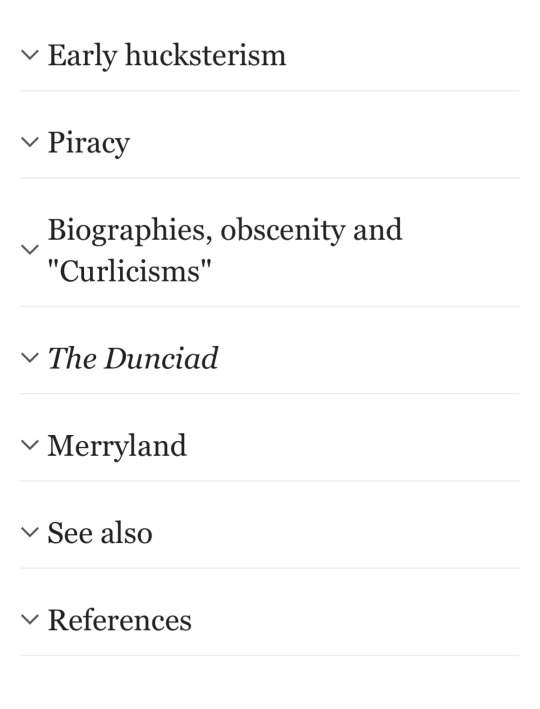
critics have always been the same
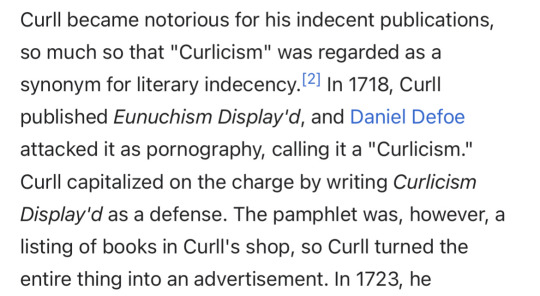
and of course where there is 1700s literary drama, alexander pope is always involved. no wonder byron idolized him and was involved in a seven-year long public debate concerning him... honoring him the way he'd like to be remembered (see: the pope-bowles controversy). don juan rly was a tribute to him. we need a series about the restoration era (behn/wilmot/dryden/etc) & of course the young romantics (byron/shelleys/keats/etc) and now we also need the augustan era (pope/montagu/now curll, etc.). someone please pplease please let me do an anthology series (in the vein of ahs or black mirror) about literary communities throughout history already!
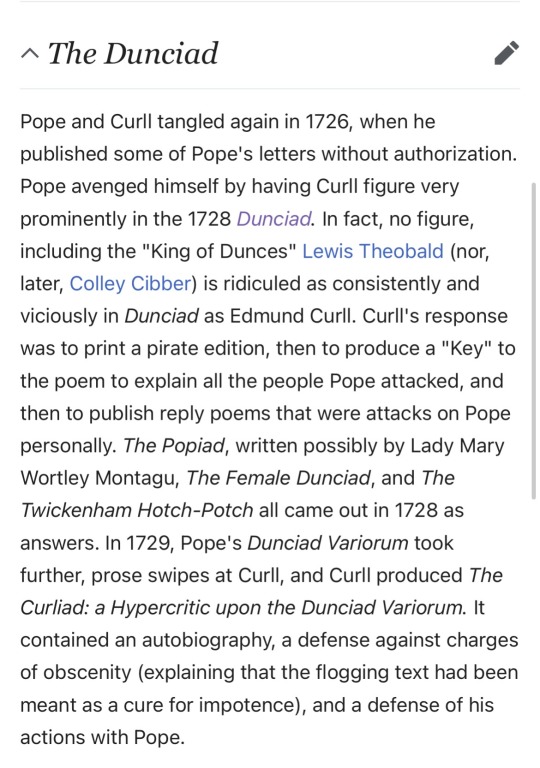


cartoonish levels of opportunistic behavior. manipulating every situation to work in his favor like a sitcom character...
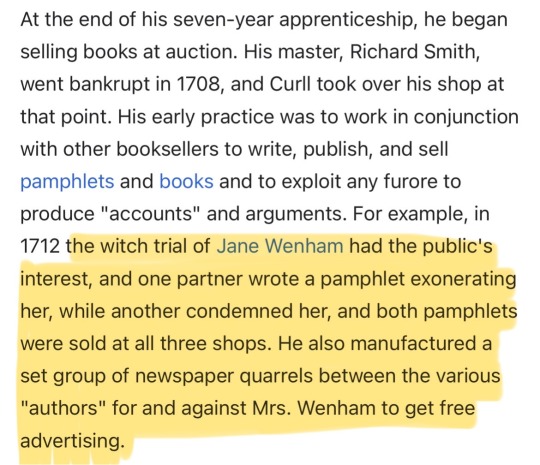
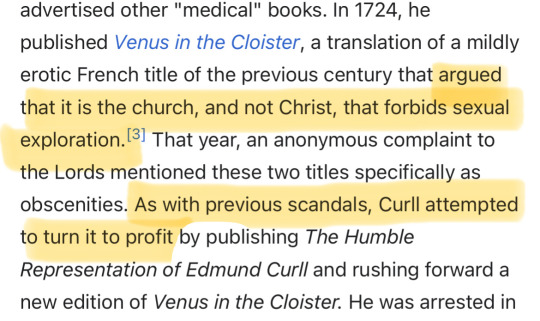

the most informative thing i've learned from edmund curll's wiki page is that in the 1700s, the name of the U.S. state "maryland" inspired a whole genre of erotica novels based on puns of the idea of a "[woman's name]-land," as evidenced by "bettyland." staples of the genre included colonization as a metaphor for patriarchal sexual conquest, & erotic descriptions of the female body which borrow from descriptions of natural landscape. much to think about re: postcolonial feminism - this quite literally proves the idea that colonization is inherently patriarchal
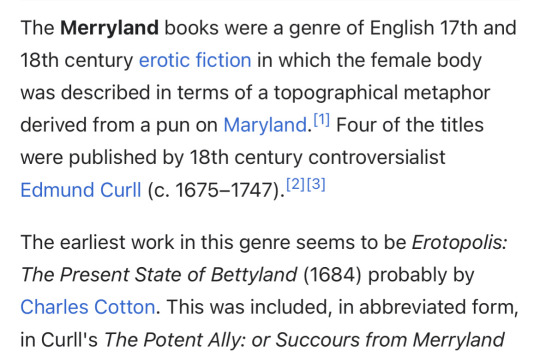
#EARLY HUCKSTERISM#alexander pope#the dunciad#wikipedia rabbit hole#wikipedia#edmund curll#literature#english literature#lit#books#feuds#literary feuds#history#funny#hilarious#memes#roast#slander#lord byron#literary history#english history#publication#publishing#long#my writing#publishers#pamphlet wars
79 notes
·
View notes
Text
27 Book Publishing Companies For Authors Without Agents
By Dave Chesson, Last updated on October 10th, 2024
If you've ever considered seeking publishing companies to take a look at one of your books, you could find a literary agent, or there are plenty of legitimate publishing companies that accept proposals from authors without agents too!
[...]
Although small publishing houses don't have the same clout with retailers or the same resources for marketing and publicity, most still have talented editors, designers, and passionate professionals for publishing great books.
Table of contents
Thinking of the Big 5...Maybe Not?!
Publishing Companies To Consider (Even If You're a New Author)
27 Book Publishing Companies That Accept Proposals Directly From Authors
Here's How To Find More Publishing Companies
Beware of Vanity Pressess...
Get After It
19 notes
·
View notes
Text

This image says a lot about what one of the characters is, he is a detective sergeant from the city of Luna, located in Lyca (fictional country in the Hybrid Society book series) This character is called Dave Wingates and will have a hard time in the series of books that I will launch next year. Believe it or not, this book will have an English version too! This art was made by KevinWolf, one of the first artists to join the Furverse publisher.
Está imagem diz muito do que um dos personagens é, ele é detetive sargento da cidade de Luna, localizado em Lyca (país ficticio da série de livros Hybrid Society) Este personagem se chama Dave Wingates e passará por maus bocados na série de livros que lançarei no ano que vem. Acredite se quiser, este livro vai ter versão em inglês também! Está arte foi feita por KevinWolf, um dos primeiros artistas a ingressar na editora Furverse.
Follow me in Telegram! - https://t.me/+UhZMahCpWb9lYjgx
Siga-me no telegram! - https://t.me/+UhZMahCpWb9lYjgx
#furry art#sfw furry#anthro#books#furry#furry oc#fursona#animation#wolf#wolves#animals#detective books#police drama#police#police romance#books os drama#inglish book#brasil#Brazil#editora#publishers
15 notes
·
View notes
Note
Totally random question, but I was wondering if you're gonna self-publish your book(s) or publish traditionally? Just curious!!
I want to publish traditionally, because while I am a bit optimistic and ambitious, I am not organised nor motivated enough to go through the gruelling efforts to self-publish, even though I know it can have great benefits and potential, and help get your name out there.
I would rather study the market and roll the dice with traditional publishing, for the main purposes of:
My lack of knowledge or experience in the publishing world, and what it takes to make a book launch successful;
And costs, self publishing seems very costly, so maybe when I have published a few books I’ll consider self-publishing?? When I have the resources ahahahahahha
But the YA/magic fantasy I am working on currently seems very… marketable?? Which is a horrible way to look at it, but it’s also true??
I just want to be a published author, who writes for a living, like obviously THE DREAM is new york times bestseller, but I think working as an author and writing for a living is the actual reward that I am striving for— working a job that I have always dreamed of doing😍😍😍
Now, I am very delulu about this, but I am convinced that this is something very achievable, and something I can achieve within the next five years which is also delulu, but y’know what?? I’d rather live in this fantasy where everything is possible than not hehehe
#your honour she is delulu#but she is happy#and isn’t that all that matters#*she says while being on chapter four of said novel*#the goal is to finish the first and second draft within the year#and send it to editors#publishers#which is overly ambitious#but also very doable#but if you don’t believe you can do it#then you can’t#so i believe i can#and will#ranting#ask
13 notes
·
View notes
Text
Dear Hair,
I cut you as punishment.
Force you to stare
As pieces of your body
Float to the ground
Where we are both bound
And you screech and screech
In agony
You dare ask me why
When you had spent
Most of your time
With your long tendrils
Coiled and knotted
Sometimes so tight
I found bits of you between my
My pearly whites
But you grow and grow
Even with a blade to your throat.
~M.M
251 notes
·
View notes
Text

"The walls are the publishers of the poor" (EN: English)
#The walls are the publishers of the poor#felix the cat#felix#comics#comic#cartoons#cartoon#memes#meme#walls#publishers#poor#class war#161#1312#anti capitalism#antifascist#antiauthoritarian#antinazi#anti imperialism#anti colonialism#anti cop#anti israel#antiwork#anti slavery#fuck work#eat the rich#eat the fucking rich#antiracism#how to be an antiracist
27 notes
·
View notes
Text


'THQ - "GameBoys"'
[GBC] [GERMANY] [MAGAZINE, BANNER] [2000]
Games in banner (left to right)
NHL 2000
Madden 2000
Tiger Woods PGA Tour 2000
Micro Machines 1 and 2: Twin Turbo
The Rugrats Movie
Logical
WWF Wrestlemania 2000
Source: big.N, February 2000 (#93) || Gaming Alexandria; Joey Wawzonek (via the Internet Archive)
#gaming#advertising#thq#game boy color#handheld#publishers#developers#companies#video games#2000#germany#banners
9 notes
·
View notes
Text
Sooo do publishers just grow on trees or
9 notes
·
View notes